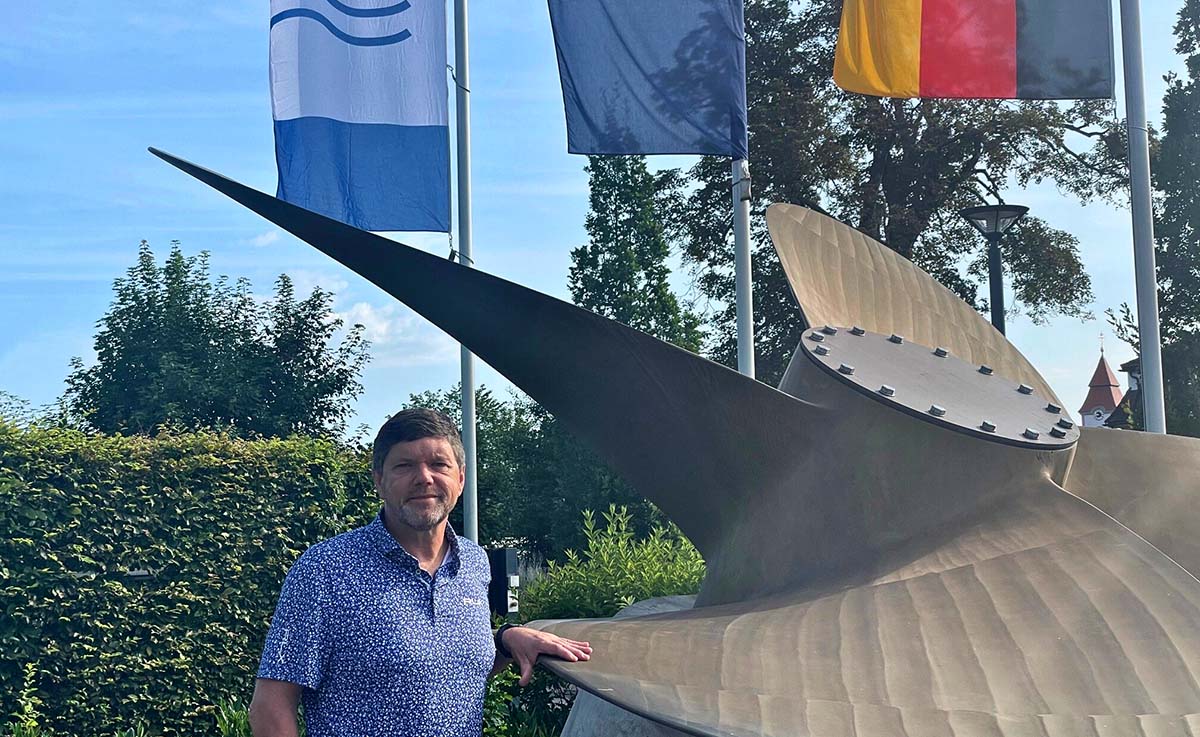
MINSHIP is one of NNPC’s largest and oldest members, focusing on the deep-sea market and Atlantic trade. It’s a unique company operating from Schnaittenbach, Bavaria – a region in Germany hardly known for its shipping – with roots in the kaolin trade dating back to the early 80s. Since then, they’ve expanded into Hamburg and today manage a large fleet of ships.
Responsible for these management duties is Markus Hiltl, managing director at MINSHIP Group since 2018. He has been with the company for far longer than that, however, starting out there as a local from Schnaittenbach a good 35 years ago! “I’m very happy to be in shipping and haven’t regretted this choice a single day in my life,” he tells us. In this interview, we sit down with Mr. Hiltl to talk about MINSHIP and the challenges the shipping industry faces.
Could you tell us a little about MINSHIP’s beginnings?
“When the company was launched, we primarily served the kaolin industry in shipping bulk and later kaolin slurry from the Americas to Europe. Kaolin is a mineral used as a pigment in the paper industry, but also porcelain and ceramics. We soon expanded into other minor bulk commodities and regions, adding ships over time to transport within the Atlantic and adjacent waters.”
Does the kaolin business still exist?
“Yes, it continues to be one of our pillars: kaolin is shipped in dry bulk and slurry form. Nowadays, kaolin is primarily shipped from Brazil / the Amazon basin, rather than our traditional sources in the US. However, like I said, we have also diversified into transporting other commodities such as grain, fertilizers, steels… anything which suits the managed fleet, really.”
MINSHIP also manages ships for other companies, correct?
“In 2017, the company decided to separate the assets (ships) from the management side of the business. This was done to increase visibility and transparency, and also to attract business from third parties. On the management side, we offer commercial as well as technical / crewing services to assure the wellbeing of the vessels under our care. We do this both for our ‘in-house’ ships and those of others. The currently managed fleet of fifteen vessels – to which three ships will be added this year – includes modern and fuel-efficient bulk carriers, but also MPP multi-purpose ships.”
Could you tell us a little about how you expanded operations into Hamburg?
“In 2021, we took over a company called Auerbach Bereederung (shipmanagement) in Hamburg. This was at the peak of the corona epidemic. It took us about two years to fully integrate these professionals, combining Bavarian with Hamburg virtues to create a unified team working at a service level of excellence. Currently, we have fifty-five employees, most of them here in Bavaria. It’s a young, ambitious team with a modern mindset, coupled with experienced leadership. We recently started to strengthen our Hamburg office to increase our visibility and be recognized on the coastline too.”
MINSHIP has been with NNPC for a long time. Why did a German company choose to sign up with a Dutch P&I club?
“NNPC was already around as MINSHIP’s P&I club when I joined the shipping business in 1985. The link to NNPC goes back to our founder, Jürgen W. Ruttmann. He used to work in Rotterdam, in the 1970s. The connection was made then. As for myself, I’ve always been happy with NNPC’s services. They’re very supportive. I like the idea of being in league with a small P&I club that offers a lot of personal attention. In London or other shipping centers, with the larger clubs, one may not get that as much. NNPC is very good at addressing things and helping out quickly.”
Which developments do you see in the shipping world right now?
“The big thing currently are the various geopolitical conflicts across the world. Because of the Russian-Ukrainian war, we’re avoiding the Black Sea. We are not trading to or from Russia or deal with Russian cargoes or entities, even if non-sanctioned. We avoid the Red Sea because of Houthi raids. In general, though, we are quite well-prepared to deal with these circumstances by being flexible and diversified.”
What is the biggest challenge facing MINSHIP, and how are you addressing it?
“Decarbonization is without a doubt number one. Going carbon-neutral is a big challenge. The European Union has set up a system with carbon certificates that need to be purchased in order to be compliant with the regulations. Some time ago, we started to rejuvenate our fleet and currently have very fuel-efficient vessels in management. This helps steer us in the direction of carbon-neutral shipping. Digitization plays another big role in planning. It has always been the case that the shipping market is in flux, has its ups and downs. What really helps to navigate it is to have well-educated, dedicated people in our group. This allows us to successfully manage our fleet and we invest a lot in having a great team that is able to achieve all of this.”
You have a very positive outlook!
“Shipping remains an interesting business to stay in. There is never a dull moment in shipping. I’m almost sixty years old and I will bring in my experience and expertise for a few years more, until it is time to hand it over to a younger generation. This will put MINSHIP in an excellent position in the world of shipping for decades to come.”